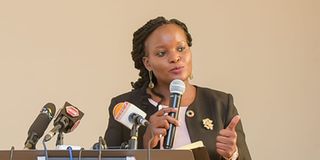Premium
Empowering people with disabilities: Inclusion and technology take centre stage

Harriette Chiggai, the President’s Advisor on Women’s Rights.
The government has put in place frameworks and strategies aimed at promoting inclusion and supporting economic growth by providing greater access to the labour market and education for persons with disabilities.
Women's Rights Advisor, Harriet Chiggai, highlighted the ongoing efforts at both national and organisational levels to recognise the significant challenges of exclusion and marginalisation faced by people living with disabilities, and to address these issues and promote inclusion.
According to the Persons with Disabilities Act in Kenya, persons with disabilities are entitled to a barrier-free and disability-friendly environment to enable them to access buildings, roads and other social amenities, as well as assistive devices and other equipment to facilitate their mobility.
Speaking at the Annual Conference on Inclusion, which opened yesterday, Chiggai said there is an urgent need to recognise the need to address the exclusion and marginalisation that has become evident and that these issues are not only human rights issues but also have significant economic implications for countries.
"With an estimated 15 per cent of the world's population facing barriers to accessing opportunities and achieving economic self-sufficiency, the impact goes far beyond undermining the rights and dignity of persons with disabilities. It places a significant burden on our country's social welfare system," said Ms Chiggai.
"We already have frameworks in place to guide our inclusion strategies as a nation and as an organisation, such as sustainable development, with specific objectives such as ensuring equal and accessible education by providing inclusive learning opportunities for all," said Ms Chiggai.
However, Ms Chiggai said it was important to address this challenge head on and that there was an urgent need to develop and implement assistive technologies, digital accessibility initiatives and inclusive ICT policies for people with disabilities in Kenya and across Africa.
"According to the World Health Organization (WHO), more than one billion people worldwide have disabilities, 80 per cent of whom live in developing countries. These disabilities can take many forms, including sight, hearing, speech, mobility and psychosocial issues. In Africa alone, more than 50 per cent of the population lives with some form of disability," said Ms Chiggai.
"This alarming statistic serves as a wake-up call, highlighting the urgency of ensuring that people with disabilities are not left behind in terms of digital services, healthcare, education and other basic needs. It is a journey that has already begun as we strive to address this situation and bring about positive change. By harnessing the potential of technology and fostering an inclusive environment, we can empower people with disabilities to overcome barriers, lead fulfilling lives and contribute meaningfully to society," she said.
Speaking to people with disabilities and experts, she said the use of technology is a key catalyst in a journey of inclusion, opening doors to education and learning, facilitating access to employment opportunities and enabling independent living.
"Through assistive devices, specialised software and innovative solutions, individuals can communicate, navigate their environment and engage in activities that were once out of reach. By harnessing the power of technology, we can bridge the digital divide and create a more inclusive society that values and supports the abilities of every individual, regardless of their disability," she said.
Since its inaugural event in 2020, the Inclusive Africa Conference has become a powerful catalyst for progress in the field of digital accessibility and assistive technology for people with disabilities across the African continent. Now in its fourth consecutive year, this annual conference remains dedicated to driving the advancement of inclusive practices and raising awareness of the imperative to leave no one behind.





